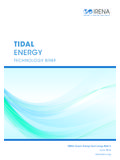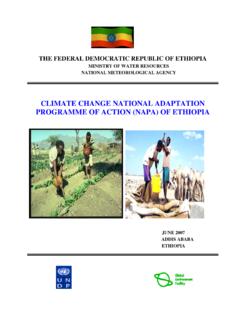Transcription of CLIMATE CHANGE AND RENEWABLE ENERGY
1 CLIMATE CHANGE . AND RENEWABLE ENERGY . NATIONAL POLICIES AND. THE ROLE OF COMMUNITIES, CITIES AND REGIONS. A report from the International RENEWABLE ENERGY agency (IRENA). to the G20 CLIMATE Sustainability Working Group (CSWG). JUNE 2019. IRENA 2019. Unless otherwise stated, material in this publication may be freely used, shared, copied, reproduced, printed and/or stored, provided that appropriate acknowledgement is given to IRENA as the source and copyright holder. Material in this publication that is attributed to third parties may be subject to separate terms of use and restrictions, and appropriate permissions from these third parties may need to be secured before any use of such material.
2 ISBN: 978-92-9260-136-2. Citation: IRENA (2019), CLIMATE CHANGE and RENEWABLE ENERGY : National policies and the role of communities, cities and regions (Report to the G20 CLIMATE Sustainability Working Group (CSWG)), International RENEWABLE ENERGY agency , Abu Dhabi. About IRENA. The International RENEWABLE ENERGY agency (IRENA) is an intergovernmental organisation that supports countries in their transition to a sustainable ENERGY future and serves as the principal platform for international co-operation, a centre of excellence, and a repository of policy, technology, resource and financial knowledge on RENEWABLE ENERGY . IRENA promotes the widespread adoption and sustainable use of all forms of RENEWABLE ENERGY , including bioenergy, geothermal, hydropower, ocean, solar and wind ENERGY , in the pursuit of sustainable development, ENERGY access, ENERGY security and low-carbon economic growth and prosperity.
3 Acknowledgements G20 CLIMATE Sustainability Working Group members provided valuable comments and suggestions on this study. The report was prepared by Elisa Asmelash and Ricardo Gorini. IRENA colleagues Emma Aberg, Francisco Boshell, Yong Chen, Rabia Ferroukhi, Diala Hawila, Sandra Lozo, Divyam Nagpal, Habone Osman Moussa, Michael Renner, Costanza Strinati, Stephanie Weckend and Adrian Whiteman also provided valuable review and feedback. Available for download: For further information or to provide feedback: Disclaimer The designations employed and the presentation of materials featured herein are provided on an as is basis, for informational purposes only, without any conditions, warranties or undertakings, either express or implied, from IRENA, its officials and agents, including but not limited to warranties of accuracy, completeness and fitness for a particular purpose or use of such content.
4 The information contained herein does not necessarily represent the views of all Members of IRENA, nor is it an endorsement of any project, product or service provider. The designations employed and the presentation of material herein do not imply the expression of any opinion on the part of IRENA concerning the legal status of any region, country, territory, city or area or of its authorities, or concerning the delimitation of frontiers or boundaries. CONTENTS. Executive 1. 2. CLIMATE CHANGE , sustainability and RENEWABLE SDGs and synergies with RENEWABLE 12. The risks of not meeting established CLIMATE goals and the opportunity for sustainable 13. Characterising the gap: Setting NDCs in pursuit of the 2050 global ENERGY transformation.
5 14. 3. The next stage: Unlocking further flexibility through Three pillars of action for closing the gap in the buildings, industry, power and transport 18. Distributed ENERGY resources (DERs) changing the power-sector paradigm: Electrification, decentralisation and 24. 4. Decentralised solutions for RENEWABLE ENERGY and ENERGY efficiency 27. Methods for utilising 27. City and island/off-grid applications: Different uses of 33. 5. Challenges and actions to further DER 45. Topic 1: Policy and regulatory 47. RECOMMENDATION: Adjust planning, markets and regulation to make them enablers of 47. RECOMMENDATION: Co-ordinate policies both vertically (local/national). and horizontally (among ministries).
6 48. Topic 2: Finance 49. RECOMMENDATION: Review finance 49. Topic 3: Resources and capacity RECOMMENDATION: Promote networks to facilitate and invest in capacity building and education for behaviour 50. Topic 4: Products and services RECOMMENDATION: Encourage innovations in DER products and services while facilitating technology 51. 52. 3. FIGURES. Figure 1: Linkages between SDG 7 and other 12. Figure 2: How the level of global warming affects impacts and risks associated with the reasons for concern (RFCs) and selected natural, managed and human 13. Figure 3: Cumulative ENERGY -related CO2 emissions and emissions gap, 2015-2050 (Gt CO2).. 14. Figure 4: Annual ENERGY -related CO2 emissions and reductions, 2015-2050 (Gt/yr).
7 15. Figure 5: TPES and RENEWABLE and non- RENEWABLE shares in the Reference and REmap cases, 19. Figure 6: Scaling up renewables not just for power, but also for heat, building uses and 20. Figure 7: Innovation 25. Figure 8: The landscape of innovations for the power-sector 26. Figure 9: Potential for corporate sourcing of RENEWABLE 29. Figure 10: Aggregators: Key facts and 36. Figure 11: Case for off-grid RENEWABLE ENERGY 40. Figure 12: DERs: G20 framework for 45. 4. TABLES. Table 1: Community ownership models: Legal forms and Table 2: Concrete actions for G20 46. BOXES. Box 1: Ongoing work: The G20, IRENA and the CLIMATE and Sustainability Working 10. Box 2: NDCs: Current status and 16.
8 Box 3: Global ENERGY Transformation: A Roadmap to 17. Box 4: Japan's Do it Ourselves installation model for rooftop 32. Box 5: ENERGY transition strategy for Zhangjiakou City, 39. 5. ABBREVIATIONS. CCA Community Choice Aggregation IRENA International RENEWABLE ENERGY agency CO Community ownership ISEES Institute for Sustainable ENERGY CO2 Carbon dioxide and Environmental Solution CSWG CLIMATE and Sustainability IT Information technology Working Group kWh Kilowatt-hour DER Distributed ENERGY resources MW Megawatt DG Distributed generation NDCs Nationally Determined Contributions DHC District heating and cooling NGO Non-governmental organisation DIO Do it ourselves (Japanese rooftop solar programme)
9 O&M Operation and maintenance DIY Do-It-Yourself PPA Power purchase agreement EAC ENERGY Attribute Certificate PPP Public purchase agreement EEAP ENERGY Principles and ENERGY PV Photovoltaic Efficiency Action Plan RFC Reason for concern EJ Exajoule SDG Sustainable Development Goal ESWG ENERGY Sustainability Working Group SIDS Small Island Developing States EV Electric vehicle SWG Sustainability Working Group FiT Feed-in tariff TEC Total ENERGY consumption G20 Group of Twenty TEPCO Tokyo Power Electric Company GDP Gross domestic product TES Thermal ENERGY storage GHG Greenhouse gas TFEC Total final ENERGY consumption Gt Gigatons TPES Total primary ENERGY supply GW Gigawatt TWh Terawatt-hour GWh Gigawatt-hour UNFCCC United Nations Framework IEA International ENERGY agency Convention on CLIMATE CHANGE IoT Internet of Things UK United Kingdom IPCC Intergovernmental Panel USD United States Dollar for CLIMATE CHANGE VRE Variable RENEWABLE ENERGY 6.
10 EXECUTIVE SUMMARY. The special report from the Intergovernmental Panel on CLIMATE CHANGE (IPCC) in late 2018, underlining the growing impact of global warming, calls for urgent action. This response, moreover, must happen on an unprecedented scale and at speed if the world is to avoid the most catastrophic consequences of CLIMATE CHANGE . Considering that two-thirds of greenhouse gas (GHG) emissions originate from the ENERGY sector, the IPCC emphatically calls for an immediate transformation of the world's ENERGY system with massive uptake of renewables and steadily increasing ENERGY efficiency (IPCC, 2018). Several global forums are developing action plans to accelerate this ENERGY revolution, both through Sustainable Development Goals (SDGs) endorsed by the United Nations and through Nationally Determined Contributions (NDCs) in line with the Paris Agreement.













